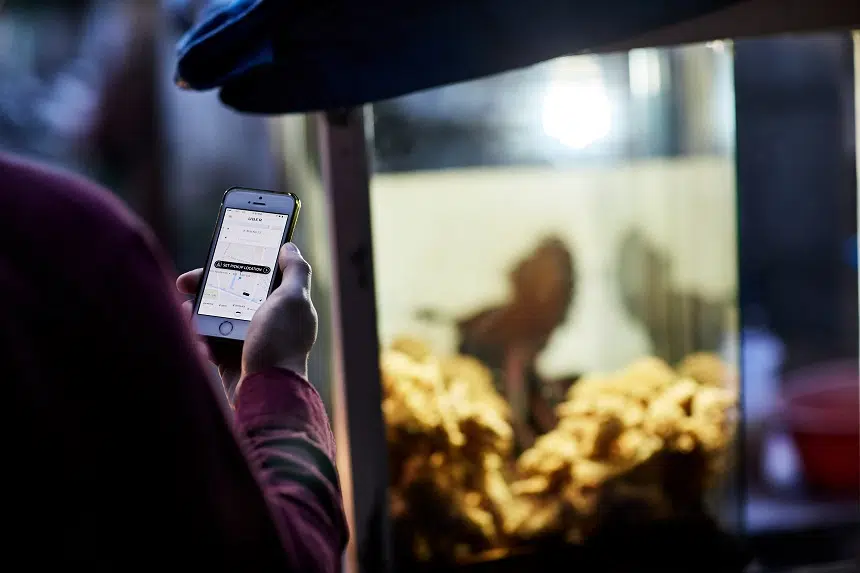Saskatoon has become the first city in Saskatchewan to open their doors to ride sharing services after an 8-2 vote approving rules for the industry on Monday.
The decision green lights the possibility of introducing companies like Uber and Lyft into the Bridge City in time for the Christmas and New Year’s Eve rush, if they get their applications in on time.
Spokespeople for Uber and Lyft wouldn’t say when they would begin operations in the city, while Canadian ride sharing company TappCar’s representative in council chambers told 650 CKOM they would need more time to get ready.
“We hear time and time again how people want the service,” Michael van Hemmen, Uber general manager for western Canadian cities, said.
“We’ve seen thousands of people open the app in Saskatoon at the airport, downtown, in every neighbourhood. We know people want the service and we’d love to provide it.”
City staff indicated a company could begin accepting rides the day after a successful application package was submitted.
The rules passed by city council were unchanged from what was approved at city hall in July, including a minimum fee of $3.75 per ride sharing service — the same minimum as taxis.
There were also a series of distinctions made between ride sharing vehicles and taxis in the temporary bylaw:
- Ride-share vehicles won’t require an in-car camera, while taxis do.
- Only taxis will be able to stay at taxi stands and pick up street hailers.
- Individual ride-share drivers won’t be required to get a business licence — taxi drivers must do so.
- The number of ride-share drivers will be unlimited, unlike taxi plates.
- Peak time surge pricing will be allowed for ride-sharing, not for taxis.
The bylaw was initially on hold as the city waited for the province to introduce its own regulations, which were announced in late November.
City councillors made the decision despite a series of public speakers standing up against the ride sharing industry, most of whom managed taxi companies or drove cabs.
“If these (ride share) drivers come here … I’m going to be living on the street,” taxi driver Vincent Moostoos said.
Kelly Frie, director of the Saskatchewan Taxi Cab Association (STCA), took issue with council’s support of not capping the number of ride share drivers in the city while taxis were capped at 210 licences.
He called on the city to either cap the ride sharing services, or to allow unlimited cabs on the road.
However, he said the preference was to have a capped market.
“We want a sustainable market for the future, and I don’t think an uncapped market is sustainable,” Frie said.
The STCA and drivers also raised concerns about the provincial decision to allow both taxis and ride sharing vehicles to be operated by drivers with basic Class 5 licences, as long as they have a clean driving record.
Before the provincial rules emerged, all taxi drivers required a Class 4 licence — which includes an annual medical fitness test.
However, the city made clear it didn’t have the jurisdiction to mandate an upgraded licence within Saskatoon alone.
Councillors Bev Dubois and Hilary Gough expressed concern the decision on ride sharing was being rushed after the provincial regulations were released, and were alone in voting to delay the debate until February.
They were also the only councillors to vote against the bylaw.
Councillor Sarina Gersher was not part of the discussion after declaring a conflict of interest in discussing the taxi industry, due to her family’s business.
Taxis warn they could convert to ride shares
Many taxi drivers who addressed council argued they could lose their livelihoods due to the introduction of ride sharing in Saskatoon, while taxi executives argued they would be hamstrung and would lose significant market share.
One of those executives, manager Carlo Triolo, suggested taxi companies might have to take drastic measures to compete with companies like Uber.
He said taxi brokers might convert to ride sharing services, removing their top lights and taxi meters in favour of only providing app-based rides.
Triolo said there would be significant “public outcry” as a result, because people without credit cards or smartphones would be left out in the cold.
When asked for clarification by 650 CKOM, Triolo said it wasn’t something the companies were necessarily planning on doing — but rather something he sees as the “inevitable future” of the industry if unfair rules continue to be passed.











